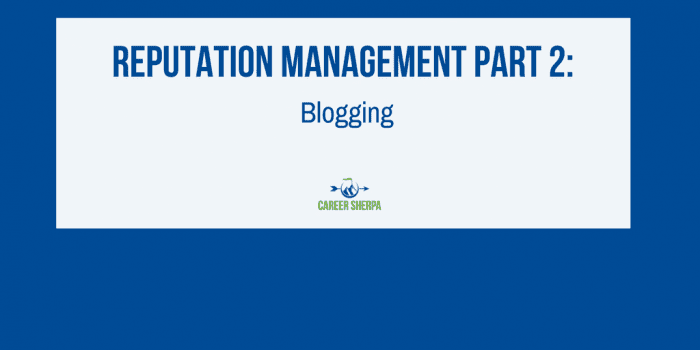Here we are, Reputation Management Part 2! Blogging to build your reputation.
Yesterday’s post was about using LinkedIn to begin building an online reputation. Here is the link in case you missed it: Building Your Reputation Management Part 1: LinkedIn
We all want to be known for something. Be sure to demonstrate your best qualities and skills online. Be nice, be sincere, be helpful, be generous. This is all part of your brand/reputation as well.
Finally, and perhaps most importantly, blogs were designed to be interactive. Try to develop relationships with people by asking for comments. Interact with your readers, that is what makes a blog different from a website.
If you haven’t thought about starting a blog, maybe now is the time. I remember when I first started, I had so many questions and there were so many options I felt overwhelmed. Let’s keep this simple and uncomplicated. These are just my recommendations based on my experience and a pretty basic level of technological savvy. I had to self-teach myself a lot but it has been worth every minute I’ve invested.
Here’s a quick reminder: use the right keywords and phrases and use them consistently across various platforms. This is one of the best ways to develop your reputation. (This includes your name and photo too.)
To Blog Yourself
You may be thinking you don’t have the stamina, ideas, or even desire to start a blog by yourself. Don’t rule out blogging just yet. Ask yourself these questions before you decide one way or another:
- Can I commit to writing once a week (or at least once a month)?
- What area of expertise do I want to showcase?
- Who is my audience (who would benefit from reading what I have to say)
Yes, there are many other things to consider and you can check out ProBlogger for more on getting started and improving your blogging. These are particularly good resources as well:
Starting Your First Blog? 29 Tips, Tutorials and Resources for New Bloggers from Problogger
Use LinkedIn’s Publishing Platform to Tell Your Story
Choosing Your Weapon (I mean platform)
Wordpress is the more popular of the platforms for blogging. I have found it has the newest and greatest bells and whistles (themes, plugins and widgets).
- Wordpress.com (free)
- Wordpress.org (you have to pay to host it on a server)
I would suggest you ask around and pick a platform that someone you know is using. This will make it so much easier for you to get your questions asked and help for your problems. There are two more options if you aren’t ready to buy your own domain and host a blog on a site you own.
- Medium (free, but they own the platform)
- LinkedIn (free, but they own the platform)
Nope, Not Ready to Jump off That Bridge (yet)
Perhaps this is sounding like too much of a commitment. Fine, start commenting on blogs in your industry. You will be able to contribute to the conversation and begin building relationships, learning and acquiring digital terrain.
So where do you find good blogs to comment on?
Commenting Guidelines:
- Be professional at all times
- Check grammar, punctuation, spelling before submitting comments
- Join in on the conversation by reading the other comments and contributing, adding, politely disagreeing or supporting
- Add value to the post by adding your thoughts on the topic/issue
- Be sure to keep it relevant to your areas of expertise
- Be generous and gracious and polite
- Use your real name/the name by which you want to be found by
Log in/Sign in
Commenting on blogs usually requires that you sign in. The choices you have vary depending on the blog. You want to use the same login/profile consistently. You can also sign in with other accounts such as your Facebook, Twitter or Google. Discus is another popular sign in tool bloggers use.
Then other times you can use your name, email and URL/website. If you don’t have a website, use your LinkedIn URL (I think this will work, let me know if it doesn’t).
Blog Comments: Part of Your Online Executive Brand Communication Plan from Executive Career Brand (Meg Guiseppi)
Guest Blogging
Maybe you don’t feel ready to commit to hosting your own blog. If you find a blog you like, you might be able to become a guest blogger. Many times blogs are looking for people to contribute. See if there is a “guest blogging policy” on their site and follow those instructions. Reach out and introduce yourself but it might be a good idea to interact on the blog via comments first to build name recognition. If you go this route, you should have samples of your work and be a strong writer or a new angle.
Here are some parting thoughts and I am sorry this is longer than I intended it to be.
- Watch and listen.
- See what others are doing
- Experiment with new ideas
- Have fun
- Build a community
- Make your blog interactive, ask for comments, feedback, ideas, other solutions
And Part 3 in this series of reputation management is going to talk about Twitter!

Hannah Morgan speaks and writes about job search and career strategies. She founded CareerSherpa.net to educate professionals on how to maneuver through today’s job search process. Hannah was nominated as a LinkedIn Top Voice in Job Search and Careers and is a regular contributor to US News & World Report. She has been quoted by media outlets, including Forbes, USA Today, Money Magazine, Huffington Post, as well as many other publications. She is also author of The Infographic Resume and co-author of Social Networking for Business Success.

